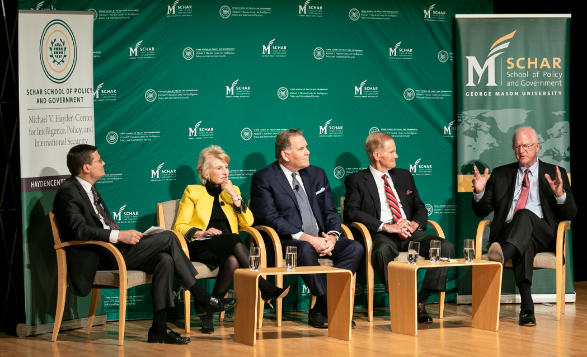By Alexander Naumov

On March 11, 2019, the Michael V. Hayden Center and the Schar School of Policy and Government hosted a discussion, “The Hill Has Eyes: Congressional Oversight of Intelligence” at the Ronald Reagan Building and International Center in Washington, D.C. Schar School Dean Mark Rozell gave a warm welcome to General Michael Hayden (ret.), the Center’s founder and distinguished visiting professor at the Schar School, in what was his first public appearance after suffering a stroke last November.
The panel, part of the Center’s Accountability of Intelligence series, included former Senate Select Committee on Intelligence (SSCI) members Saxby Chambliss and Bill Nelson and former House Permanent Select Committee on Intelligence (HPSCI) members Jane Harman and Mike Rogers. Former CIA Acting Director and Deputy Director Michael Morell, who is also a current Hayden Center Senior Fellow and host of the Intelligence Matters podcast, moderated the discussion.
Senator Mark Warner, Vice Chairman of the SSCI with eight years of experience on the committee, opened the discussion, commenting that the SSCI was the “last bipartisan committee in Congress.” Former Rep. Jane Harman, who served eight years on the HPSCI and now leads the Woodrow Wilson International Center for Scholars, latter emphasized the importance of bipartisanship when conducting oversight.
Former Rep. Rogers said that good oversight requires a time commitment and learning the broader context of issues – which many in Congress fail to do. Former Sen. Chambliss praised the critical work of committee staff and noted the necessity of ‘downrange’ visits with intelligence officers. Former Sen. Nelson, who served on the SSCI when General Hayden led the CIA, told an amusing story of when he tried to convince the director to waterboard him in an effort to get firsthand knowledge of the controversial technique. For obvious reasons, General Hayden did not comply with Sen. Nelson’s request, although he did arrange for a briefing that allowed Sen. Nelson to understand the technique “point-by-point” and better inform his political discussions going forward.
The panel was unanimous in decrying the politicization of intelligence oversight. Rep. Harman said that the House committee was much more partisan than its Senate counterpart, which she called “a perpetual election machine” that discouraged behind-the-scenes, in-depth reading and instead promoted grandstanding. Sen. Nelson added that there is an extra obligation for committee leaders to rise above partisanship when there is a disconnect between the Intelligence Community and the White House. Sen. Chambliss recommended that, while such disagreements are normal and healthy, presidents should keep them private. To illustrate, he compared today’s Russian election interference controversy to the 2007 National Intelligence Estimate (NIE) of Iran’s nuclear program: while he and his colleagues had doubts in the NIE’s findings, those doubts didn’t generate a New York Times story.
The panel also answered audience questions about covert action and the Russia investigation. Rep. Rogers complained that the complications of Title 10-Title 50 operations (where both military and civilian assets are used) are self-inflicted and “almost comical” for US interests abroad. He also said that an intelligence committee is not the place to investigate finances, and “guilt by inference is dangerous in a democracy” in the context of possible collusion with Russia.
To view the full-length panel discussion, click here.
To view our other events, including the other installments of the Accountability of Intelligence series, visit our YouTube page.
Alexander Naumov is an undergraduate student at Schar School of Policy and Government majoring in international politics and Russian and Eurasian studies.
